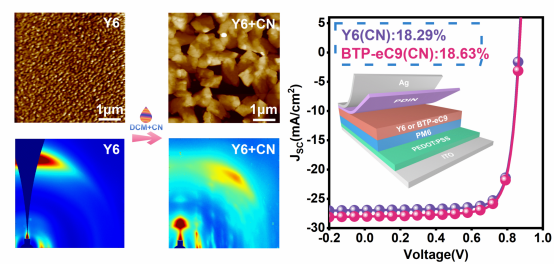In July 2024, The team of Professor Kan Zhipeng from SKL is entitled "Room-temperature-modulated polymorphism of nonfullerene acceptors enables efficient bilayer organic solar cells" was published in the Energy & Environmental Science.

Polymorphism of nonfullerene acceptors enhances electron transport properties and potentially impacts the performance of organic electronic devices. However, their application in organic solar cells is limited by the required high-temperature thermal annealing, as the high-temperature treatment often detrimentally affects the active layer morphology. Herein, we demonstrate that polymorphs of nonfullerene acceptors, such as Y6 and BTP-eC9, can be modulated at room temperature and significantly improve the power conversion efficiency of bilayer organic solar cells. Polymorphs with varied orientations and scales are formed in the neat Y6 and BTP-eC9 films cast from the poor solvent with high-boiling-point solvent additives. Bilayer devices, comprising the acceptor layers with polymorphs and a PM6 layer, are fabricated, and we attain a champion power conversion efficiency of 18.63% (18.17% certified) with superior device stability. The performance of the bilayer devices outperforms the counterparts with polymer layer PM6 processed with solvent additives, providing concrete proof that solvent additives optimize the morphology of the small molecular acceptors rather than the polymer donor. Our results provide comprehensive insights into low-temperature-processed polymorphism and the nature of the impact of solvent additives for high-performance nonfullerene organic solar cells.